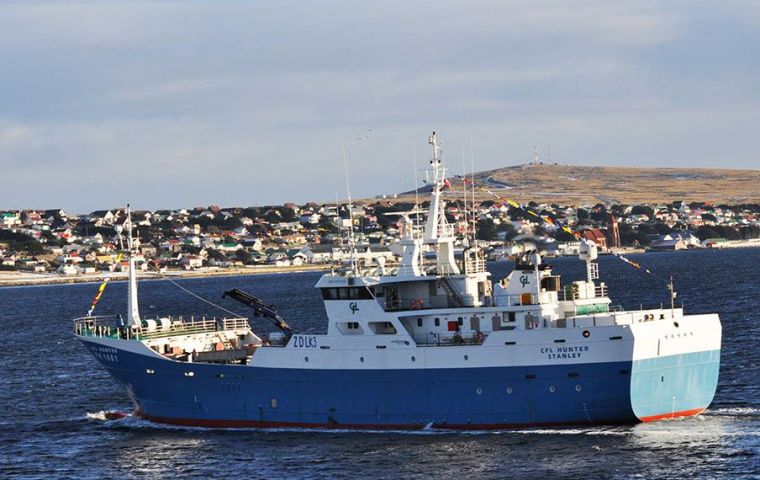MercoPress. South Atlantic News Agency
Falkland Islands Outlines Fiscal Strategy for 2018/19 and Beyond
 “The Falkland Islands Government obtain almost 60% of its annual revenue from the fishing sector” (Pic R. Goodwin)
“The Falkland Islands Government obtain almost 60% of its annual revenue from the fishing sector” (Pic R. Goodwin)  MLA Hon. Teslyn Barkman said that, when taken together, these principles are designed to ensure responsible developing of public services.
MLA Hon. Teslyn Barkman said that, when taken together, these principles are designed to ensure responsible developing of public services. The Falkland Islands Executive Council (its effective Cabinet) agreed late last week a set of budgeting principles for the Government over the coming financial year beginning 1st July 2018. These principles are likely to apply throughout the four year term of the current Legislative Assembly, though will be formally reviewed by the Assembly annually.
Member of the Legislative Assembly Hon. Teslyn Barkman said that these principles when taken together are “designed to ensure responsible and directed spending in areas essential to public services, as well as developing and supporting the Islands”.
The Government is currently deemed to be in a strong financial position, with recent budget surpluses in the last two financial years, and an asset balance of £223 million. With Government operating expenditure in the Islands averaging about £50 million per year in recent years, this means that the Government has over four times operating expenditure in reserve.
The principles agreed for the next budget cycle, the first of this Legislative Assembly, covered a range of issues. They were underpinned by the guiding document of the Islands Plan, a multi-year strategic plan which successive Governments have published over the past decade or more.
A number of the eleven principles agreed will be a continuation of long-standing fiscal policy in the Islands. However, there are notable differences under this new Government.
Firstly, there appears to be a political will to look at the tax system within the Islands to ensure that it supports and facilitates future economic growth. This may be due to the hope to develop an offshore oil industry, with a need to have in a place a full and coherent fiscal regime if the current commercial oil discoveries to the North of the Islands are to be developed.
Secondly, the restriction of the Government looking to balance its budget annually appears to have been partially lifted. The Government will continue to look to the long-term viability of the Islands finances within an environment of variable annual income; but this may not mean looking to balance the budget annually. The adoption of this approach merely only seems to formalise what was becoming existing practice in the Islands anyway as over recent years the Government has approved projected budget deficits due to the reserves the Government holds.
There also appears to be a renewed focus on the financial operations of the Government in terms of how quickly it collects cash and reinvests this money into productive activities, either domestically or on the overseas investment markets. Tied to this is an intention to look to fully recognise all known liabilities of the Government, including its c. £150m of pension liabilities. These are currently not formally accounted for within the Governments annual financial statements.
In line with commitments made during the November 2017 election cycle, there are clear political commitments to engaging with other private sector bodies to improve delivery of public services in the Islands. This is likely to focus most specifically in the area of capital projects where elements of the Islands population have been critical of both costs and time taken to deliver them.
Ultimately the full Legislative Assembly of the Islands need to agree the final budget. According to the timeline provided by the Government this is to be done in late May with the final budget likely to be formally announced on the 1st June 2018. It will then come into force on the 1st July 2018.




Top Comments
Disclaimer & comment rules-

-

-

Read all commentsPE
Jan 30th, 2018 - 09:21 pm +6None of your business Patrick...nothing to do with Argentina. Your opinion is valueless.
At Golfcronie, our Pat is a US born Argentine? of Italian immigrants, He recently had to leave Argentina when his tourist visa ran out, yet he claims to be Argentine. He is now a devout Malvinsta well known in the Falklands forums on FB but living back in his native Italy.
Jan 31st, 2018 - 06:03 am +4PE
Jan 31st, 2018 - 09:38 am +4This is just a slight change from the well known Argentine mantra “the whole world knows”
“anybody in the world who knows about the Falklands conflict knows ”
Well Patrick, you keep showing us time and time again that you nothing about it !
Patrick will simply choke one day on his own bile.
By the way, do you have a real job ?
Commenting for this story is now closed.
If you have a Facebook account, become a fan and comment on our Facebook Page!